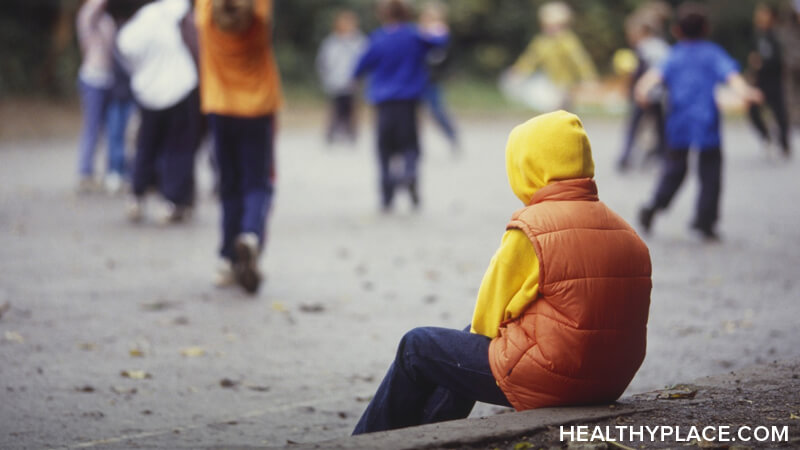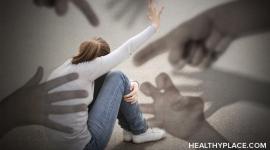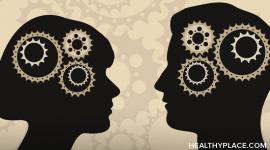What Are the Schizophrenia Symptoms in Children and Teens?

Children and teenagers can show symptoms of schizophrenia and develop the illness. According to the DSM-5 (American Psychiatric Association, 2013), it’s rare for schizophrenia to begin before adolescence, but it does happen. The earlier signs and symptoms appear, the worse the illness becomes for someone living with it as he or she ages. Therefore, knowing schizophrenia symptoms in children and teens can mean earlier treatment and potentially better functioning into adulthood.
Signs and Symptoms of Schizophrenia in Childhood
Researchers are making strides in identifying schizophrenia symptoms and signs early in life. Still, it can be incredibly difficult to diagnose schizophrenia in young people. Schizophrenia symptoms in a child can be vague and subtle. If a child has delusions and hallucinations, they’re not as defined and complex as those in an adult. Hallucinations, for example, are primarily visual rather than multi-sensory.
Other signs that point to the possibility of schizophrenia symptoms in a child include:
- Reaching developmental milestones later than usual
- Problems with verbal skills
- Information processing difficulties
- Neurological soft signs (subtle, non-specific abnormalities such as difficulties with fine motor skills, that aren’t severe enough to fit into any disorder)
- Difficulty paying attention
- Problems with motor skills, seen as clumsiness or awkwardness
- Poor social development
- Poor school performance
- Behaviors that are considered “odd” by both adults and other kids
The signs and symptoms of schizophrenia in a child are very different from those of teens and adults. Despite this, the illness is still considered to be schizophrenia.
Symptoms of Schizophrenia in a Teenager (Adolescent)
Adolescence is generally a difficult stage of development. When schizophrenia is in the picture, the challenges of teenhood skyrocket. In large part, the schizophrenia symptoms for a teenager are close to those of an adult. They can experience any of the defining symptoms of schizophrenia:
- Delusions
- Hallucinations
- Disorganized speech
- Disorganized or catatonic behavior
- Negative symptoms
While teens can experience all of these, they are less likely than adults to have delusions, and, as in childhood, their hallucinations are more likely to be visual than multi-sensory.
Negative symptoms of schizophrenia aren’t uncommon in adolescence in general. Many of these are frequently noticeable:
- Withdrawal from family, friends, and activities
- Drop in school performance
- Irritability
- Depressed mood
- Trouble sleeping
- Behavior that seems “off” or strange
- Apathy, loss of interest in things formerly enjoyed
- Substance use
Diagnosing schizophrenia in non-adults is complex. Just as important as knowing what the symptoms are is knowing what they are not.
Why It’s Important to Be Careful in Diagnosing Schizophrenia in Children and Teens
Diagnosing schizophrenia too early can lead to incorrect treatment as well as the missed diagnosis and treatment of the actual problem. One of the biggest challenges in properly diagnosing this illness is that in young children and teens, it shares symptoms with a wide variety of other disorders.
Many things must be ruled out before a child can be diagnosed with schizophrenia. One such thing is normal development. Fantasy play is a normal part of the development and can look like visual hallucinations or delusions. Fantasy play is healthy and should be encouraged. If no other symptoms are present, then the behavior is part of being a child.
Symptoms can overlap between schizophrenia and other disorders and developmental problems like these:
- Language delays
- Late or unusual crawling
- Late walking
Metabolic disorders should be ruled out. Additionally, symptoms of neurodevelopmental disorders are seen in schizophrenia as well and must be considered. Two such disorders that can mimic some schizophrenia symptoms are autism spectrum disorder and ADHD. Neurodevelopmental disorders are much more common than schizophrenia in children, so it important to consider autism, ADHD and other conditions:
- Language disorder
- Speech sound disorders
- Social (pragmatic) communication disorder
- Learning disorders
- Developmental coordination disorder
- Stereotypic movement disorder
Schizophrenia symptoms are often unrecognized in the teen years as well. As in childhood, the symptoms can resemble other things like:
- Depression
- Anxiety disorders
- Medical conditions
- Undetected learning disability
Teen symptoms of schizophrenia don’t just mimic other disorders. Rather than being seen as early (prodromal) symptoms of the disorder, they can be dismissed as teen angst, the typical moodiness of teens, or a stage to outgrow.
Recognizing the schizophrenia symptoms in a teenager and schizophrenia symptoms in a child is important so proper treatment can begin. When treatment is delayed, the risk of severe schizophrenia and its consequences increases. With identification and treatment come a better prognosis and quality of life.
APA Reference
Peterson, T.
(2021, December 28). What Are the Schizophrenia Symptoms in Children and Teens? , HealthyPlace. Retrieved
on 2026, February 23 from https://www.healthyplace.com/thought-disorders/schizophrenia-symptoms/what-are-the-schizophrenia-symptoms-in-children-and-teens



